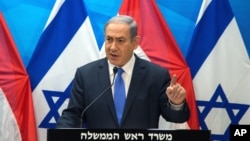The news that major world powers and Iran reached a historic deal aimed at ensuring that Iran does not obtain the nuclear bomb was met with condemnation by Israel but hailed by the United Nations and Russia.
Israeli Prime Minister Benjamin Netanyahu called Tuesday's nuclear deal with Iran "a bad mistake of historic proportions" and vowed to keep up efforts to block the Islamic Republic from obtaining an atomic bomb.
United Nations Secretary-General Ban Ki-moon congratulated negotiators on finalizing an agreement in a statement Tuesday.
"I warmly welcome the historic agreement in Vienna today and congratulate the P5+1 and Iran for reaching this agreement. This is testament to the value of dialogue," Ban said in the statement.
"I hope – and indeed believe – that this agreement will lead to greater mutual understanding and cooperation on the many serious security challenges in the Middle East. As such it could serve as a vital contribution to peace and stability both in the region and beyond," the statement said.
In Russia, President Vladimir Putin said, with the nuclear agreement, the world can breathe a sigh of relief, and that the negotiating countries made hard choices for stability and cooperation.
The European Union hailed it as a new chapter of hope for the world.
Regional governments
The Pakistan and Afghanistan governments released statements welcoming the nuclear agreement.
Afghan President Ashraf Ghani, in a statement, "welcomed any efforts that result in expansion of political and economic relations between states as well as consolidation and strengthening of peace and stability in the region."
While Pakistan said in a statement, it "has consistently maintained that the Iran nuclear issue should be peacefully resolved through dialogue. As a neighbouring country, we have also reiterated that reciprocal confidence-building measures relating to Iran’s nuclear programme auger well for peace and security in our region."
Pakistani defense analyst Talat Masood, a retired Pakistani general, told Islamabad PTV News the agreement “will bring an extraordinary change. Its positive effects will include improvement in relations between Iran and the Western world, particularly the United States, and gradual lifting of the sanctions imposed on it.
“Moreover ... it is also likely to change the balance of power between Iran and the Arab countries in the Middle East, something Iran has been striving for," Masood said.
Widely criticized in Israel
However, reaction was critical across the political spectrum in Israel, where concern is high the country's arch enemy has duped the world and will acquire nuclear weapons to use against Israel.
Iran already backs militant groups that attack Israel and its leaders frequently have referred to Israel's destruction in the past.
Netanyahu has been at the forefront of global opposition to the deal and has openly clashed with the Obama administration and other Western powers that have been pushing for an easing of sanctions in return for greater restrictions on its nuclear program.
Netanyahu showed no signs of tempering his criticism Tuesday and added a veiled threat of his own.
"One cannot prevent an agreement when the negotiators are willing to make more and more concessions to those who, even during the talks, keep chanting: 'Death to America,' " he said, before meeting with Dutch Foreign Minister Bert Koenders.
Commitment against acquiring weapons
"We knew very well that the desire to sign an agreement was stronger than anything, and therefore we did not commit to preventing an agreement. We did commit to preventing Iran from acquiring nuclear weapons, and this commitment still stands," he said.
Israel received an official copy of the Iran nuclear agreement Tuesday, according to the Haaretz website.
On Monday, Israeli Defense Minister Moshe Ya'alon criticized the potential nuclear agreement.
Ya'alon told Israeli officials that "even if there are some last-minute improvements, the agreement as we understand it is bad, allowing Iran to legitimately become a nuclear threshold state. The bottom line is, a bad deal is coming, and after it, we will have to be prepared to defend ourselves on our own."
On Tuesday, Ya'alon told The Jerusalem Post that the agreement was built on "lies and deceit."
Lobbying effort
Israel's first course of action looks to be an intense lobbying effort in the U.S. Congress to oppose the deal.
Deputy Foreign Minister Tzipi Hotovely said Israel "will employ all diplomatic means to prevent confirmation of the agreement."
Netanyahu's coalition partners angrily criticized Tuesday's agreement. Education Minister Naftali Bennett, who heads the hawkish Jewish Home party, said July 14 will be remembered a "dark day for the free world." Cabinet Minister Miri Regev said the agreement gave Iran a "license to kill."
The cascade of criticism crossed party lines, reflecting the widespread opposition to the deal in Israel.
"This is a regime based in deceit, and now they are going to do what they did for the last 20 years, which is trying to get themselves nuclear weapons behind the back of the world," Yair Lapid, the head of the opposition Yesh Atid Party, told The Associated Press. "Now they are going to do it with the help of the international community."
Netanyahu called on all sides to "put petty politics aside" and unite behind opposing Iran.
"Our concern, of course, is that the militant Islamic state of Iran is going to receive a sure path to nuclear weapons," he said, adding that Iran would get a "jackpot of cash bonanza of hundreds of billions of dollars."
"This is a bad mistake of historic proportion," he said.
Material for this report came from AP, Reuters and AFP.




